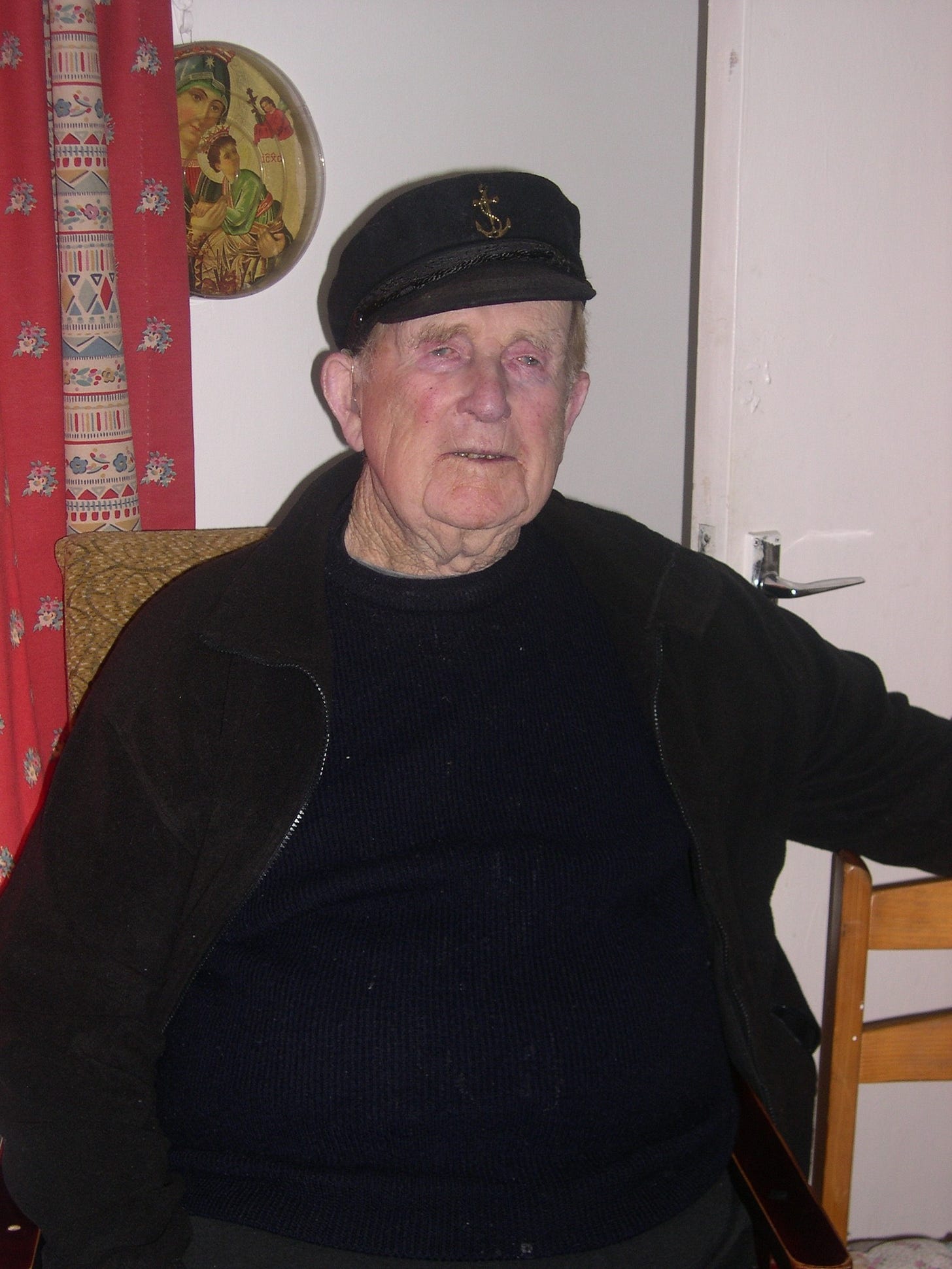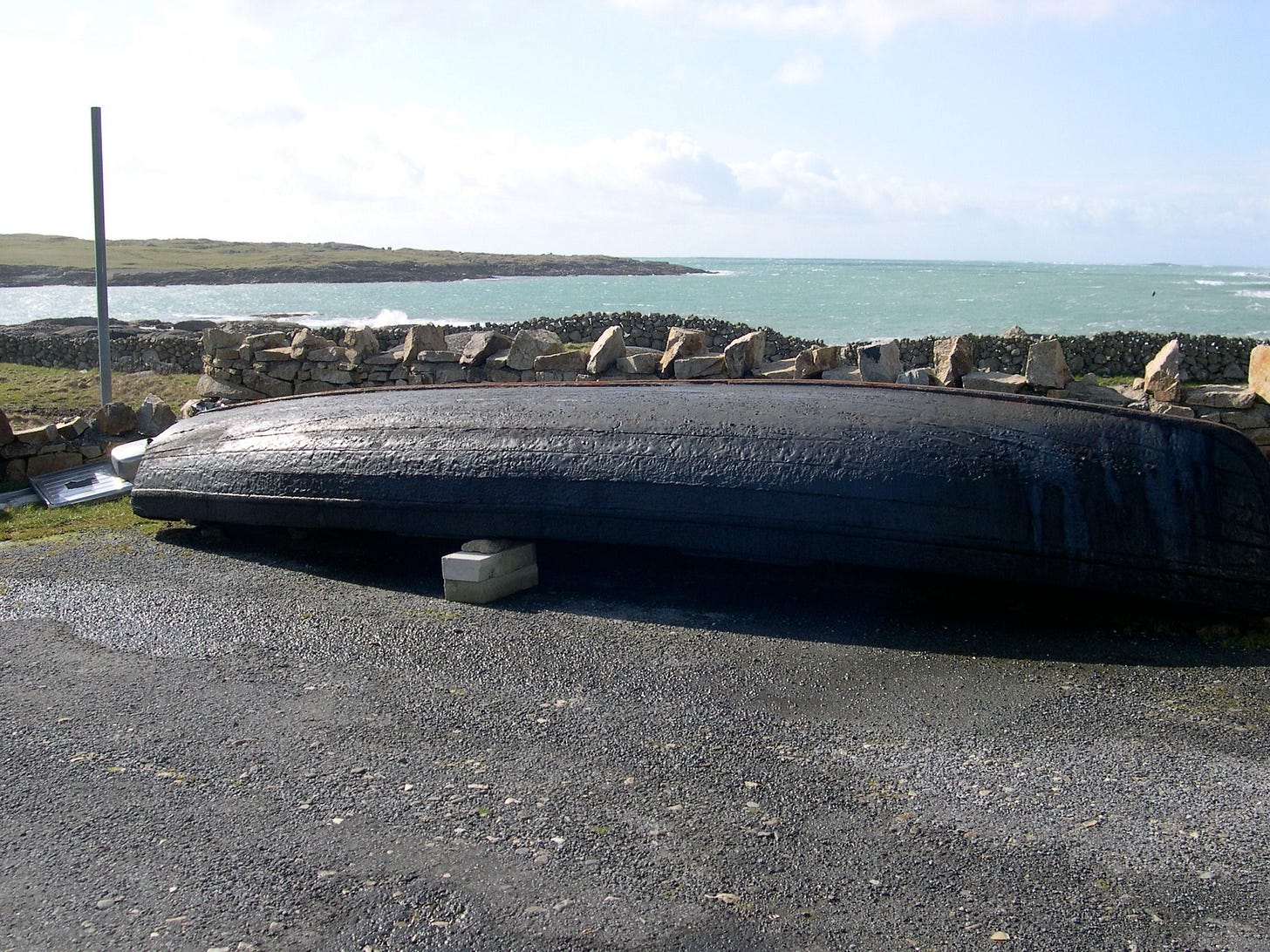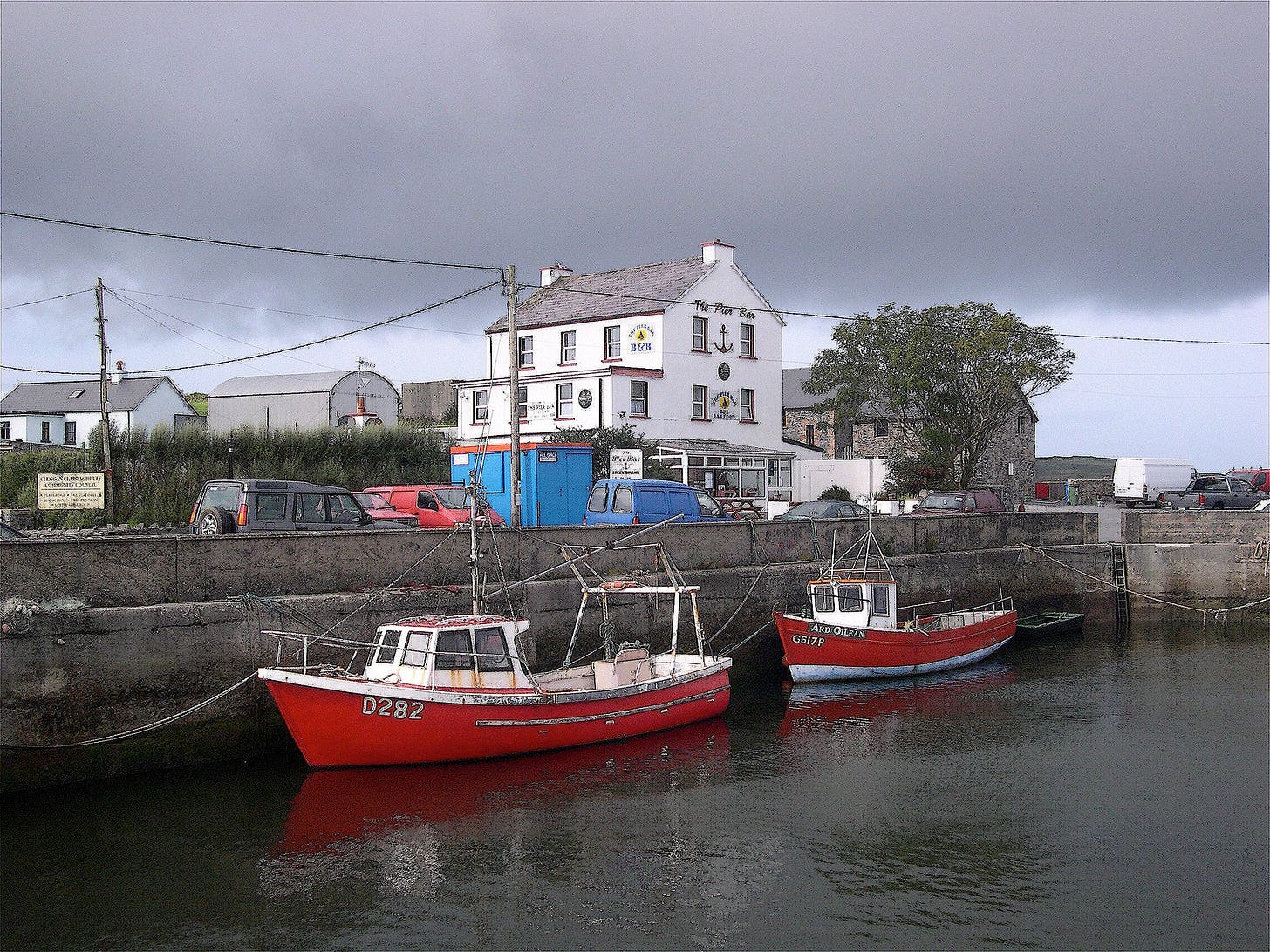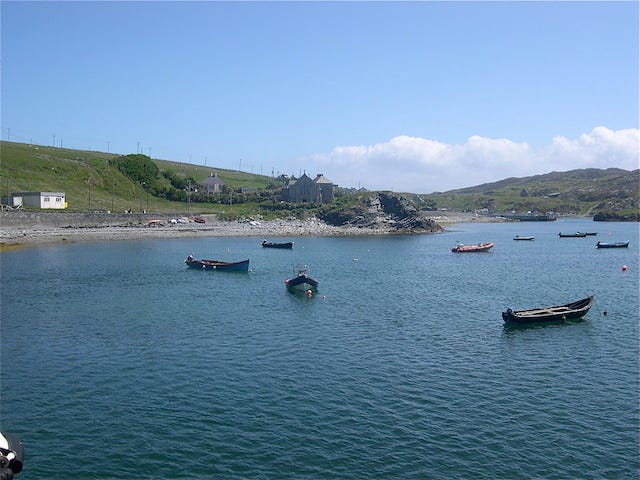Cousin Gerry had told me to go see his uncle Paddy O’Halloran on Inishbofin Island. Paddy had all the family stories and could really spin a great Irish yarn. But he was getting up there in years, fading, so I’d better not wait.
The next day, a beautiful autumn morning, I took the ferry to the island, and found directions to Fawnmore, the road up the hill to the school. I spied a cottage with a big anchor in the yard, an elderly man sitting next to it, a fisherman’s skipper’s cap on his head.
“Paddy?” I called over the stone wall toward the man sitting next to his cottage. “Paddy O’Halloran?”
He tried to ignore me. When I persisted, he cupped his hand to his ear, indicating he was unable to hear me.
“Paddy?” I turned up my volume.
“Who are you and what do you want?” He said, gazing out to the sea, the gulls sweeping the water, the waves lapping the pier, circling the ruins of the imposing old fort where Cromwell had imprisoned Catholic priests.
“Do you remember the Lynches at Claddaghduff?”
“Who?”
“The Lynches.”
“Oh, they’re all gone, that crew.”
“But you remember Michael and Mary Lynch?”
“Oh, they’re all dead—a long time now.”
“Do you remember Mark Lynch?”
“He went to The States.”
“To Iowa.”
“Where?”
“I’m his granddaughter.”
“He’s dead now, too.”
“He’s dead, but I’m alive.”
“He’s dead like all the rest in The States.”
“I’m his granddaughter.”
“Who?”
“I’m Mark Lynch’s granddaughter. Back from The States. From Iowa.”
“Oh,” Paddy said, still confused, but suddenly grasping the gist of what I had been trying to communicate. He motioned for me to come through the gate and sit beside him. “That anchor is from the Spanish Armada,” he told me.
Oh, boy, I thought.
But soon we sank into a grounded conversation about the Lynches who had lived on the worst land in Connemara which was the worst land in all of Ireland. It was so difficult to make a living farming, almost all the men were also fishermen. They had no money for boats, so they made their own. They stretched cowhide over a wooden frame, tarred it, and set out in currachs in all kinds of weather and at all times of day and night.
Paddy told me stories of my Uncle John Joe who owned the Pier Bar in Cleggan. In his boat, Paddy delivered the mail back and forth from Cleggan to Inishbofin. While on land, he spent a lot of time in that pub. Some of the islanders had told me that they would hitch a ride back to Inishbofin with Paddy. There was no schedule. You would just have to find him in the pub. He would wait there until he had a full load of people.
“In those days, that pub never did very well,” Paddy said. “I don’t know why. Some said that there was a curse on it. John Joe had inherited it.”
Paddy said that John Joe never married, but it wasn’t from lack of trying. He used to take the girls up to the rooms on the second floor, but nothing ever “stuck.”
“Then one night he bet the pub in a poker game.”
And that was the end of the family business.
And about that time, fishing mostly ended in the area, too.
“You see, we experienced the Cleggan Disaster here,” Paddy said. “After that, no one wanted to fish again.”
In those days, the herring and mackerel catches fluctuated, but in October of 1927, they were plentiful. The fish were salted in Inishbofin and Cleggan, then often exported to London, Germany, and America.
“Then one calm Friday night, around five o’clock, the men went out to fish,” Paddy said. “Four boats pushed off from Rossadillisk, near Cleggan, and five left the east end of Inishbofin.”
As usual, all the men brought holy water in the stern and their rosary beads in their pockets. Around six o’clock, they all stopped and prayed the rosary. They couldn’t afford life jackets and none of them knew how to swim. They had grown fatalistic about the sea, and thought it was better to just go down without a struggle. Then they blessed their nets with the holy water and cast them into the sea.
At that time, a retired physician in Cleggan was listening to his radio, the wires attached to two poles outside his small cottage. He heard the weather report predicting a powerful gale and sent a farm hand to warn the fishermen. On a white horse, the farm hand galloped down the road toward Rossadillisk, but it was too late.
Meanwhile, at the little Star-of-the-Sea church in Claddaghduff, the church my great-grandmother Mary Lynch had championed, Festy Lacey was praying the rosary with others who had gathered for devotions. The wind rattled the windows and ripped slates off the roof. The parishioners were thrown into darkness, their faces ashen, only the small red votive candles casting light onto the walls.
On the sea, one boat after another battled the water, the waves, and the seventy-mile-an-hour wind gusts, and finally succumbed. Some were dashed against a breaker called the Black Rock just two hundred yards away from the shore. Others, like Festy Feeney and his crew, were saved, a freak wave pitching them up into the night and onto the beach. Just three weeks before the Disaster, Feeney had had a dream that the village was raided by strangers, turning their homes upside down and leaving the children crying.
Altogether, 45 men died that night, most of them trying to save nets weighed down with fish in the water. The saltwater spray blinded some men. It tore the flesh from others’ hands rowing their boats to safety. Over a hundred dependents--widows and children--were left wailing on shore.
Some found their loved ones washed up against the rocks. Others found arms poking up out of the waves and pulled their deceased out of the water. Most of the fishermen were laid out in coffins in Our Lady Star-of-the-Sea, then buried in a common grave at St. Brendan’s on Omey Island. Many of the women and children were taken off to the poor house. Others were forced to emigrate. Rossadilisk fell into ruins, reduced to a pile of stones.
“And that night back in the church,” Paddy told me, “You know what happened? An even stronger wind blew in the door and extinguished the candles.”
Festy Lacey looked around and saw Michael Laffey, a Cleggan fisherman, standing by the door. The parishioners beckoned to him, “Come in, Laffey, and shut the door.
Michael Laffey did not move.
The parishioners gestured again.
Laffey did not respond.
A girl ran down the aisle and closed the door. “Isn’t it a wonder, Laffey, you would not close the door,” she said.
Michael Laffey just stood there in oilers, dripping wet.
“At that very time,” Paddy said, “Michael Laffey was really at sea, and probably drowned by then. His body was never found. We say the sea will never be at rest until all the drowned are delivered up to land again.”
I am pleased to be part of the Iowa Writers Collaborative. Sample our work and subscribe to the IWC Sunday Round-Up:










Mary, this is beautifully haunting or hauntingly beautiful. The pictures are stunning. More! More! More!
Perfect tale for the day.